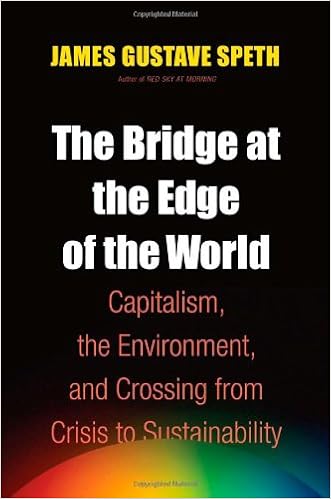Reading Time
4 hrs 42 mins
How long to read The Bridge at the Edge of the World: Capitalism, the Environment, and Crossing from Crisis to Sustainability?
The estimated word count of The Bridge at the Edge of the World: Capitalism, the Environment, and Crossing from Crisis to Sustainability is 70,370 words.
A person reading at the average speed of 250 words/min, will finish the book in 4 hrs 42 mins. At a slower speed of 150 words/min, they will finish it in 7 hrs 50 mins. At a faster speed of 450 words/min, they will finish it in 2 hrs 37 mins.
| The Bridge at the Edge of the World: Capitalism, the Environment, and Crossing from Crisis to Sustainability - 70,370 words | ||
|---|---|---|
| Reading Speed | Time to Read | |
| Slow | 150 words/min | 7 hrs 50 mins |
| Average | 250 words/min | 4 hrs 42 mins |
| Fast | 450 words/min | 2 hrs 37 mins |
- Authors
-
James Gustave Speth
More about The Bridge at the Edge of the World: Capitalism, the Environment, and Crossing from Crisis to Sustainability
70,370 words
Word Count
for The Bridge at the Edge of the World: Capitalism, the Environment, and Crossing from Crisis to Sustainability
7 hours and 34 minutes
Audiobook length
Description
How serious are the threats to our environment? Here is one measure of the problem: if we continue to do exactly what we are doing, with no growth in the human population or the world economy, the world in the latter part of this century will be unfit to live in. Of course human activities are not holding at current levelsthey are accelerating, dramaticallyand so, too, is the pace of climate disruption, biotic impoverishment, and toxification. In this book Gus Speth, author of Red Sky at Morning and a widely respected environmentalist, begins with the observation that the environmental community has grown in strength and sophistication, but the environment has continued to decline, to the point that we are now at the edge of catastrophe. Speth contends that this situation is a severe indictment of the economic and political system we call modern capitalism. Our vital task is now to change the operating instructions for today’s destructive world economy before it is too late. The book is about how to do that.
